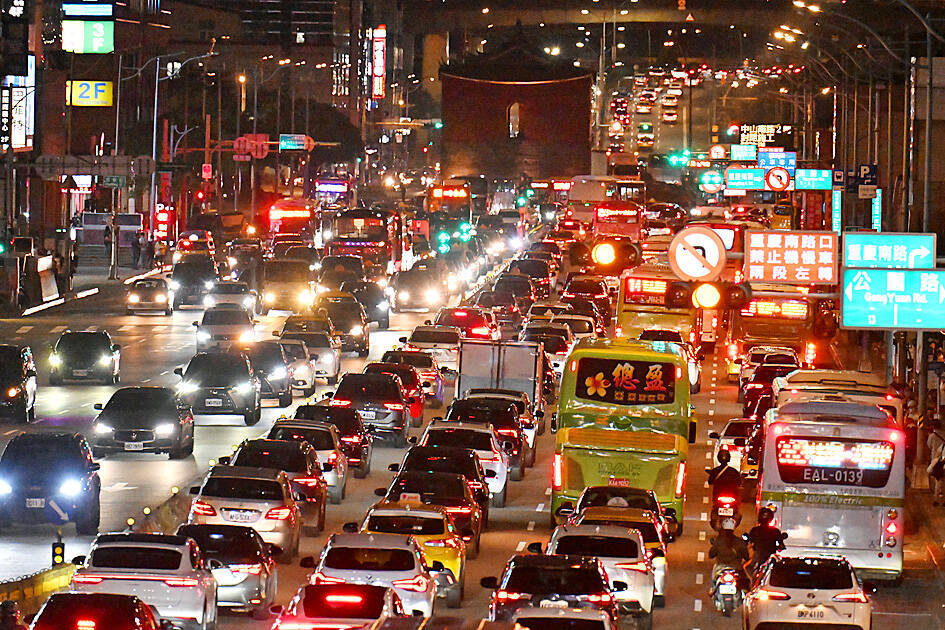The Ministry of Transportation and Communications’ National Freeway Bureau has issued safety guidelines for prescription drug users, saying that drivers taking common medicines could have impaired focus and are at heightened risk of traffic accidents.
Diminished ability to focus could be a side effect of sleeping aids, analgesics, pupil-dilating eye drops and muscle relaxers, as well as certain types of cold remedies, antihistamines, blood sugar or blood pressure drugs, and psychiatric medicines such as those used to treat depression or anxiety, Bureau Deputy Director-General Chou Ting-chang (周廷彰) said.
People should not drive if their medication causes sleepiness, fatigue, vertigo, blurry vision, slowed reflexes, loss of concentration, cold sweats, trembling, an irregular heartbeat or low blood sugar levels, Chou said.

Photo: Tien Yu-hua, Taipei Times
Drivers who do not feel well should immediately slow down and park their vehicle by the side of the road, he said.
Chou also urged people who take drugs that boost blood sugar levels to consider alternative transportation methods.
The bureau plans to coordinate with hospitals and local governments to ensure that people are informed if the medicines they take could impair their ability to drive, he said.
Separately, the bureau has launched a project to introduce a new street light scheme, in which yellow lights would be used to illuminate most of the roads’ lengths and white ones would mark street intersections, Chou said.
Yellow street lights have low glare, and the color contrast they form with white light sources could help drivers gauge their distance from the next intersection, he said.
White street lights have better illumination and grab attention, which increases driver alertness for pedestrians and other vehicles, he added.
The bureau earlier this year tested mixing yellow and white street light sources at seven intersections, and the trial results showed significant drops in the number of traffic accidents, Chou said.
Traffic Management Division Director Chiang Yu-feng (姜宇峰) said that, as of last month, the bureau had replaced street lights at 154 locations and expects the number to go up to 200 by the year’s end.

ALIGNED THINKING: Taiwan and Japan have a mutual interest in trade, culture and engineering, and can work together for stability, Cho Jung-tai said Taiwan and Japan are two like-minded countries willing to work together to form a “safety barrier” in the Indo-Pacific region, Premier Cho Jung-tai (卓榮泰) yesterday said at the opening ceremony of the 35th Taiwan-Japan Modern Engineering and Technology Symposium in Taipei. Taiwan and Japan are close geographically and closer emotionally, he added. Citing the overflowing of a barrier lake in the Mataian River (馬太鞍溪) in September, Cho said the submersible water level sensors given by Japan during the disaster helped Taiwan monitor the lake’s water levels more accurately. Japan also provided a lot of vaccines early in the outbreak of the COVID-19 pandemic,

Kaohsiung Mayor Chen Chi-mai (陳其邁) on Monday announced light shows and themed traffic lights to welcome fans of South Korean pop group Twice to the port city. The group is to play Kaohsiung on Saturday as part of its “This Is For” world tour. It would be the group’s first performance in Taiwan since its debut 10 years ago. The all-female group consists of five South Koreans, three Japanese and Tainan’s Chou Tzu-yu (周子瑜), the first Taiwan-born and raised member of a South Korean girl group. To promote the group’s arrival, the city has been holding a series of events, including a pop-up

TEMPORAL/SPIRITUAL: Beijing’s claim that the next Buddhist leader must come from China is a heavy-handed political maneuver that will fall flat-faced, experts said China’s requirement that the Dalai Lama’s reincarnation to be born in China and approved by Beijing has drawn criticism, with experts at a forum in Taipei yesterday saying that if Beijing were to put forth its own Dalai Lama, the person would not be recognized by the Tibetan Buddhist community. The experts made a remarks at the two-day forum hosted by the Tibet Religious Foundation of His Holiness the Dalai Lama titled: “The Snow Land Forum: Finding Common Ground on Tibet.” China says it has the right to determine the Dalai Lama’s reincarnation, as it claims sovereignty over Tibet since ancient times,

Temperatures in some parts of Taiwan are expected to fall sharply to lows of 15°C later this week as seasonal northeasterly winds strengthen, the Central Weather Administration (CWA) said today. It is to be the strongest cold wave to affect northern Taiwan this autumn, while Chiayi County in the southwest and some parts of central Taiwan are likely to also see lower temperatures due to radiational cooling, which occurs under conditions of clear skies, light winds and dry weather, the CWA said. Across Taiwan, temperatures are to fall gradually this week, dropping to 15°C to 16°C in the early hours of Wednesday